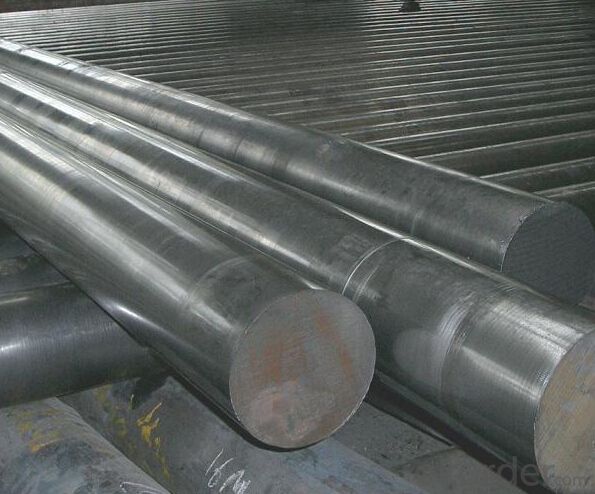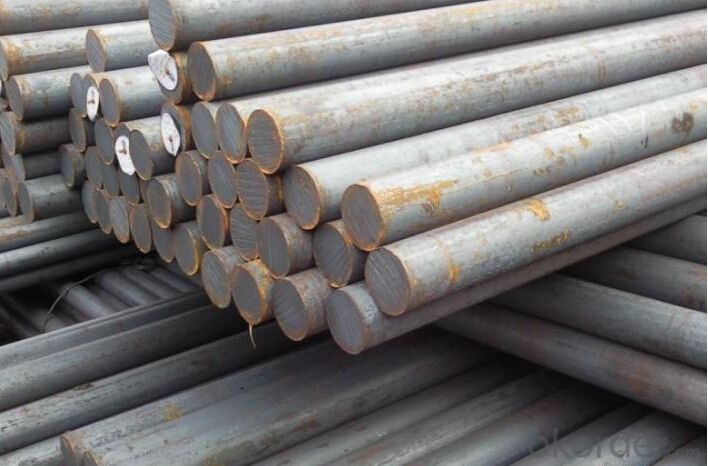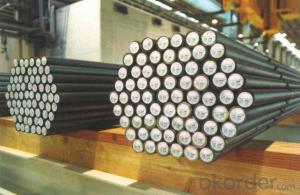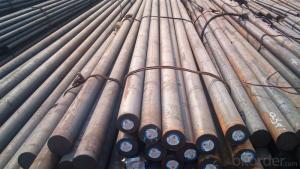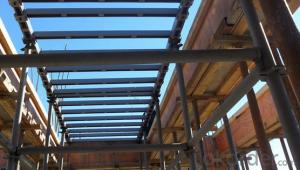Gr20Ni Bearing Steel of Special Steel CNBM
- Loading Port:
- Shanghai
- Payment Terms:
- TT OR LC
- Min Order Qty:
- 3 m.t.
- Supply Capability:
- 10000 m.t./month
OKorder Service Pledge
OKorder Financial Service
You Might Also Like
Specification
Product Description:
OKorder is offering Spring Precision and Compression with Stainless Steel at more competitive prices with stable quality. Our products have gained good reputation from all over world customer's, including America, Europ...etd
Chemical Composition:
Grade | AISI 52100, ASTM E52100, DIN 1.3505,JIS SUJ2, GCr15 |
| Length: 2000-13000mm or as required |
Shape | Round Bar |
Type | Alloy Steel Bar |
Delivery Condition | Black Surface |
Material | Bearing Steel |
Technique | Hot Rolled |
Applications:
Spring Precision and Compression with Stainless Steel are ideal for structural applications and are widely used in the construction of buildings and bridges, and the manufacturing, petrochemical, and transportation industries.
Product Advantages:
OKorder's Spring Precision and Compression with Stainless Steel are durable, strong, and resist corrosion.
Main Product Features:
· Premium quality
· Prompt delivery & seaworthy packing (30 days after receiving deposit)
· Corrosion resistance
· Can be recycled and reused
· Mill test certification
· Professional Service
· Competitive pricing
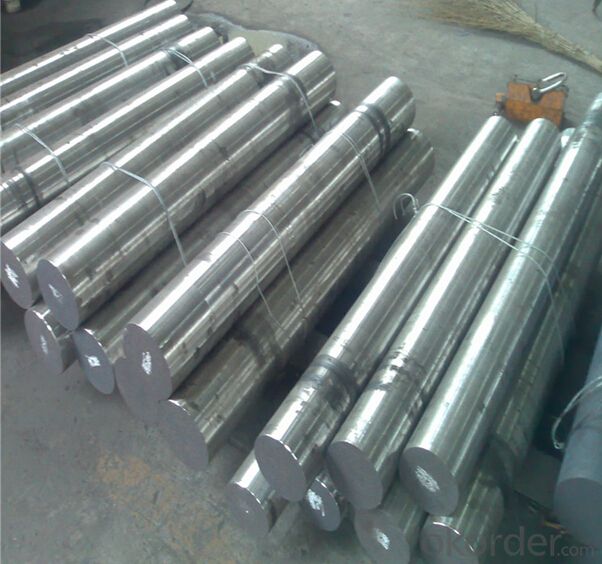
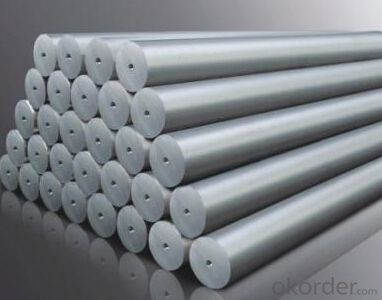
- Q: How does special steel contribute to the machinery manufacturing industry?
- The machinery manufacturing industry heavily relies on special steel, which is essential for producing high-quality and long-lasting machine components. This type of steel is specially designed to possess outstanding strength, toughness, and resistance to wear, corrosion, and high temperatures. Within the machinery manufacturing industry, special steel is specifically used in the production of crucial components like gears, shafts, bearings, and cutting tools. These components endure extreme mechanical forces, exposure to harsh environments, and repetitive motion, necessitating a material that can withstand these conditions while maintaining performance and safety. The exceptional properties of special steel empower machinery manufacturers to create equipment that is reliable, efficient, and durable. By utilizing this steel, manufacturers can enhance the overall performance and durability of their machinery, ensuring optimal functionality and minimizing the need for frequent repairs or replacements. Additionally, special steel allows for the design and production of more compact and lightweight machinery, resulting in improved energy efficiency, reduced manufacturing costs, and increased productivity. The high strength-to-weight ratio of special steel enables the production of smaller and lighter components without compromising durability or performance. Moreover, the corrosion and heat resistance properties of special steel make it suitable for industries with demanding operating conditions, such as aerospace, automotive, and energy. It ensures that machinery can withstand extreme temperatures, chemical exposure, and abrasive environments, ultimately improving safety and reliability. In conclusion, special steel significantly contributes to the machinery manufacturing industry by providing materials with exceptional strength, toughness, and resistance to wear, corrosion, and high temperatures. Its incorporation in critical components guarantees the production of reliable, efficient, and durable machinery, leading to improved performance, reduced costs, and increased productivity.
- Q: Can special steel be used for manufacturing tools?
- Yes, special steel can definitely be used for manufacturing tools. Special steel refers to a specific type of steel that is carefully engineered and designed to possess certain properties and characteristics that make it suitable for specific applications. In the case of manufacturing tools, special steel is often preferred due to its exceptional strength, hardness, and durability. These properties enable tools made from special steel to withstand high levels of stress, wear, and impact, making them ideal for demanding applications such as cutting, drilling, shaping, and machining. Additionally, special steel can also exhibit excellent heat resistance, corrosion resistance, and dimensional stability, further enhancing its suitability for tool manufacturing. Overall, the use of special steel in tool production ensures the creation of high-quality, long-lasting, and efficient tools that can effectively perform various tasks in different industries.
- Q: How is shock-resistant alloy steel used in the production of impact-resistant parts?
- Shock-resistant alloy steel is used in the production of impact-resistant parts due to its unique properties that make it highly resistant to deformation and fracture under high impact loads. The alloy steel's composition includes elements such as chromium, nickel, and molybdenum, which enhance its toughness and durability. These properties allow the alloy steel to absorb and disperse the energy generated during impact, effectively protecting the parts from damage. Additionally, the shock-resistant alloy steel's high strength enables it to withstand repeated impacts without losing its structural integrity, making it an ideal material for manufacturing impact-resistant parts used in various industries, including automotive, aerospace, and construction.
- Q: What are the main applications of special steel in the automotive electrical systems?
- Special steel is commonly used in automotive electrical systems for various applications, including the production of electrical connectors, terminals, and other components. These materials offer excellent conductivity, corrosion resistance, and high temperature stability, ensuring reliable and efficient performance in demanding environments. Additionally, special steel can be used in the manufacturing of sensors, switches, and relays, providing durability, precision, and enhanced safety features in automotive electrical systems.
- Q: How does special steel contribute to the tool manufacturing industry?
- Special steel plays a crucial role in the tool manufacturing industry by providing enhanced strength, durability, and wear resistance to tools. This type of steel is specifically designed to withstand extreme conditions and heavy usage, allowing tools to perform efficiently and last longer. With its unique properties, special steel enables the production of high-quality, precision tools that can handle demanding tasks in various industries, ultimately enhancing productivity and ensuring safety for workers.
- Q: How is structural steel used in building construction?
- Structural steel is a crucial material in building construction as it provides strength, durability, and flexibility to the overall structure. It is used to create the framework or skeleton of a building, including beams, columns, and trusses. These steel components support the weight of the building and distribute it evenly, ensuring stability and safety. Additionally, structural steel can be easily fabricated and assembled on-site, making it a cost-effective and efficient solution for various types of construction projects.
- Q: What are the different types of free-cutting steel?
- The different types of free-cutting steel include leaded free-cutting steel, sulfurized free-cutting steel, and resulfurized and rephosphorized free-cutting steel.
- Q: How does special steel contribute to the performance of industrial machinery?
- The role of special steel in enhancing the performance of industrial machinery is crucial in multiple ways. Firstly, its superior mechanical properties, including high strength, hardness, and toughness, make it suitable for withstanding heavy loads, vibrations, and impact forces commonly encountered in industrial applications. This enables the machinery to operate efficiently and reliably under demanding conditions. Additionally, special steel's excellent corrosion resistance is particularly important in industries where machinery is exposed to harsh environments or corrosive substances. By preventing component degradation due to corrosion, special steel helps extend the machinery's lifespan and reduce maintenance costs. Furthermore, manufacturers can tailor special steel to specific applications through various alloying elements and heat treatments. This optimization allows for properties like wear resistance, heat resistance, or high-temperature strength to meet the specific requirements of industrial machinery. By using special steel, manufacturers can achieve higher performance levels and improve overall efficiency. Moreover, special steel offers superior dimensional stability and machinability. This ensures precise manufacturing of components, reducing the potential for errors or inaccuracies that may affect machinery performance. The machinability of special steel also allows for easier fabrication and assembly, improving the overall production process and reducing manufacturing costs. In conclusion, special steel significantly contributes to the performance of industrial machinery through its superior mechanical properties, corrosion resistance, tailorability, dimensional stability, and machinability. By incorporating special steel into machinery components, manufacturers can enhance durability, reliability, and efficiency, ultimately leading to improved productivity and profitability in various industries.
- Q: What are the specific requirements for special steel used in the aerospace fastener industry?
- To ensure the safety, reliability, and performance of aircraft components, the aerospace fastener industry demands special steel that meets specific criteria. These requirements include the following: 1. Remarkable strength: The special steel used in aerospace fasteners must possess exceptional strength to withstand the extreme forces and stresses experienced during flight. This is crucial for maintaining the structural integrity of aircraft components. 2. Resistance to corrosion: Aerospace fasteners are constantly exposed to various environmental conditions, including moisture, high temperatures, and chemicals. Therefore, the steel used must have excellent corrosion resistance properties to prevent degradation and maintain the longevity of the fasteners. 3. Exceptional fatigue resistance: Due to repeated loading and unloading cycles throughout the lifespan of aircraft components, the special steel used in aerospace fasteners must exhibit exceptional fatigue resistance. This ensures that the fasteners can endure cyclic loading without fracturing or experiencing any structural failures. 4. Ability to withstand temperature variations: Aerospace fasteners are subject to extreme temperature changes, ranging from sub-zero temperatures at high altitudes to elevated temperatures near engines. The steel used should possess excellent temperature resistance to maintain its mechanical properties under these conditions. 5. Lightweight nature: In the aerospace industry, weight reduction plays a crucial role in improving fuel efficiency and increasing the payload capacity of aircraft. Therefore, special steel used in aerospace fasteners should be lightweight without compromising on strength and other necessary properties. 6. Non-magnetic features: Certain aerospace applications require non-magnetic fasteners to prevent interference with sensitive electronic equipment, such as avionics and navigation systems. Consequently, the special steel used in such cases must exhibit non-magnetic characteristics. 7. Adherence to industry standards: Special steel used in the aerospace fastener industry must meet the stringent standards and specifications established by regulatory bodies like the International Organization for Standardization (ISO) and the National Aerospace and Defense Contractors Accreditation Program (NADCAP). Complying with these standards ensures the quality and reliability of the fasteners. Overall, meeting the specific requirements for special steel used in the aerospace fastener industry is paramount to ensuring the safety and performance of aircraft components. These requirements encompass high strength, corrosion resistance, fatigue resistance, temperature resistance, lightweight properties, non-magnetic characteristics, and compliance with industry standards.
- Q: How does tool steel maintain its hardness at high temperatures?
- Tool steel maintains its hardness at high temperatures due to its high carbon content and the presence of alloying elements such as tungsten, molybdenum, and vanadium. These elements form carbides, which enhance the steel's ability to retain its hardness even under extreme heat. Additionally, the steel's fine grain structure and heat treatment processes contribute to its high temperature hardness retention.
Send your message to us
Gr20Ni Bearing Steel of Special Steel CNBM
- Loading Port:
- Shanghai
- Payment Terms:
- TT OR LC
- Min Order Qty:
- 3 m.t.
- Supply Capability:
- 10000 m.t./month
OKorder Service Pledge
OKorder Financial Service
Similar products
Hot products
Hot Searches
Related keywords


